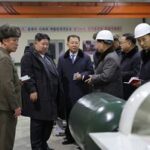South Korea, USA, and Japan Establish Real-Time Sharing of North Korean Missile Information
Eugene Park Views
Starting from the 19th, the United States, South Korea, and Japan will activate a real-time system to share information about North Korean missile alerts. This move is in response to North Korea’s accelerated missile provocations, including the launch of an intercontinental ballistic missile (ICBM) the day before. The three nations agreed to complete the information-sharing system by the end of the year during a meeting in November.

Until now, real-time missile alert information sharing regarding North Korea has been limited to a quantum dimension involving the U.S., not trilaterally. Information has been communicated among the South Korean military-U.S. Forces Korea-U.S. military and the Japanese Self-Defense Forces-U.S. Forces Japan-U.S. military, posing limitations on trilateral sharing.
However, by connecting the Hawaii Integrated Control Center under the U.S. Indo-Pacific Command to the command and control system (C4I) of the U.S. Forces Korea and U.S. Forces Japan, real-time sharing of the flight trajectory and expected impact points of North Korean missiles captured by the surveillance capabilities of the South Korean military, Japanese Self-Defense Forces, and U.S. military will be possible among the three countries. This will enable more accurate detection and tracking of missile trajectories, minimizing ‘blind spots’ and errors from the immediate provocation of North Korean missiles to their final impact. The agreement among the leaders of the three countries is effectively aimed at removing the information barrier between South Korea and Japan.
A military official said, “We (South Korea) are strong in detecting the ascending phase of the missile, while Japan excels in detecting the descending phase. Just by gathering information from all three countries, we can gain significant benefits in terms of security.”
In addition, the U.S., South Korea, and Japan have developed a plan for trilateral exercises to be implemented next year. Following the first-ever trilateral air exercise involving the B-52 strategic bomber near the Korean Peninsula this year, more diverse and intensive trilateral naval and air exercises are expected next year. A dedicated unit, the Strategic Command, will also be established to build an integrated operational system for U.S.-South Korea nuclear and conventional operations optimized for the situation on the Korean Peninsula.
A defense official stated, ‘These achievements and various efforts demonstrate the unprecedented depth, scale, and scope of the security cooperation between South Korea, the United States, and Japan. The three countries will continue to strengthen trilateral cooperation not only in response to regional challenges but also to ensure peace and stability beyond the Korean Peninsula in the broader Indo-Pacific region.
By. Nak Gyu Yang














Most Commented